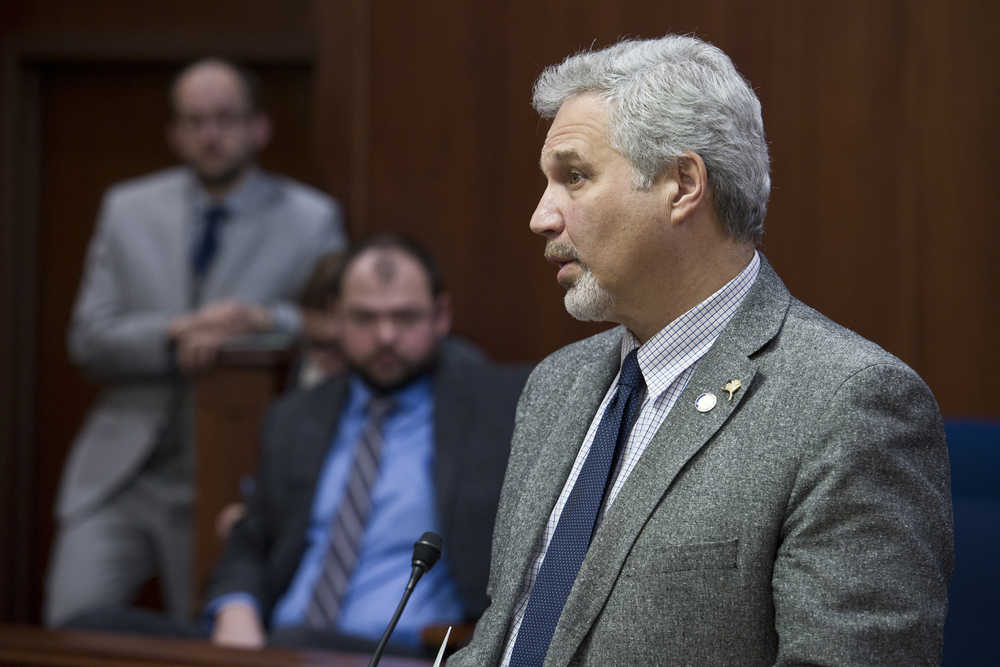Fiscal cost-cutters in the Alaska Senate have turned their attention on the state’s Public Employees Retirement and Teachers Retirement systems as they seek to level Alaska’s $4.1 billion budget deficit.
In a press conference Monday, Sen. Pete Kelly, R-Fairbanks, introduced four bills on behalf of the Senate Finance Committee, which he chairs.
The bills will, respectively, increase the local contribution for TRS, increase the local contribution for PERS, eliminate the Alaska Performance Scholarship, and decrease the state’s revenue sharing program for large communities.
“We’re not just closing our eyes and taking big, meat cleaver swings at the budget,” Kelly said, flanked by other members of the committee.
“At this time in the state’s history, the state of Alaska is on the brink of going broke,” said Sen. Lyman Hoffman, D-Bethel. “Somehow we need to come to terms with the fact that the financial condition of the state of Alaska has changed, and everything needs to be looked at and is on the table.”
Senate bills 207, 208, 209 and 210 will receive their first hearing in the Senate Finance Committee at 1 p.m. this afternoon.
Details of their effects will be revealed in the next several days as the Senate Finance Committee holds hearings and gathers public testimony. Overall, however, the net effect is to increase local governments’ share of costs while reducing the state’s costs.
SB 209 calls for raising the local government’s contribution toward public employee retirement from 22 percent to 26.5 percent by July 1, 2018. SB 207 calls for the local contribution to teachers’ retirement to rise from 12.56 percent to 22 percent by July 1, 2019.
“This bill, as I understand it, could result in significantly increased taxes,” said Sen. Bill Wielechowski, D-Anchorage, speaking on the Senate floor about SB 207’s effect on local property and sales taxes.
State and city offices were closed Monday for the Seward’s Day holiday, but Assembly member Jesse Kiehl, a staffer for Sen. Dennis Egan, D-Juneau, performed a quick estimate of some costs after examining the bills pertaining to the public employees’ and teachers’ retirement system.
“By my calculation, $2,155,000,” he said, is the cost to the Juneau School District in FY17.
Kiehl used 2013 gross salaries for the calculation, and he estimated that other branches of local government would also pay more. The City and Borough of Juneau, would pay $855,000 more for its employees; Bartlett Regional Hospital would pay $725,000 more.
As an attempt to phase in those increases for school districts, SB 208 eliminates the Alaska Performance Scholarship program for college-bound high school students and makes the program’s money available.
“If things go the way my office is planning, there will be no impact on the districts this year,” Kelly said.
Students graduating this year and those already receiving scholarships will be assured of receiving them through 2022. After that year, the program will go away.
Senate Bill 210 reformulates the state’s revenue sharing program for municipalities. According to the text of the legislation, its effect would be to raise the amount for the state’s smallest communities, while big cities – including Juneau, Anchorage and Fairbanks – would get less. According to state records, Juneau is eligible for $1.3 million in revenue sharing in the coming fiscal year. That figure is expected to drop if the bill passes.
Also included in SB 210 is a clause that would allow municipalities to change the property tax exemption for seniors older than 65. Currently, the state requires a $150,000 exemption.
If that exemption becomes optional, Kiehl said, it would have an effect on the state’s formula for school funding. That formula is based upon the taxable value of property in a municipality, and making the mandatory exemption optional – even if the size of the exemption didn’t change – would require the City and Borough of Juneau to pay $640,000 more per year for schools.
Also included in SB 210 is a clause that would allow municipalities to completely exempt homeowners 65 and older from property taxes. Currently, the state maximum property tax exemption is $150,000.
The four bills are expected to meet heated opposition from the Democratic minority in the Senate, which objected to the fact that all four – products of the Senate Finance Committee – have been referred to only that committee for review before a floor vote. That puts them on the fast track toward passage.
“We’re doing shortcuts here that are wrong,” said Sen. Berta Gardner, D-Anchorage, who asked Senate President Kevin Meyer, R-Anchorage, to send the bills to an additional committee for vetting.
The four-person minority’s ability to influence legislation in the 20-person Senate is limited, however, and Gardner’s objections were overruled.
The minority did attempt to score a political point, however, as Sen. Dennis Egan, D-Juneau, asked for a PERS bill he sponsored – SB 88 – to receive the same treatment and be referred to the Senate Finance Committee only. His request was turned down by the Republican-led majority, 13-4.
• Contact reporter James Brooks at james.k.brooks@juneauempire.com.

